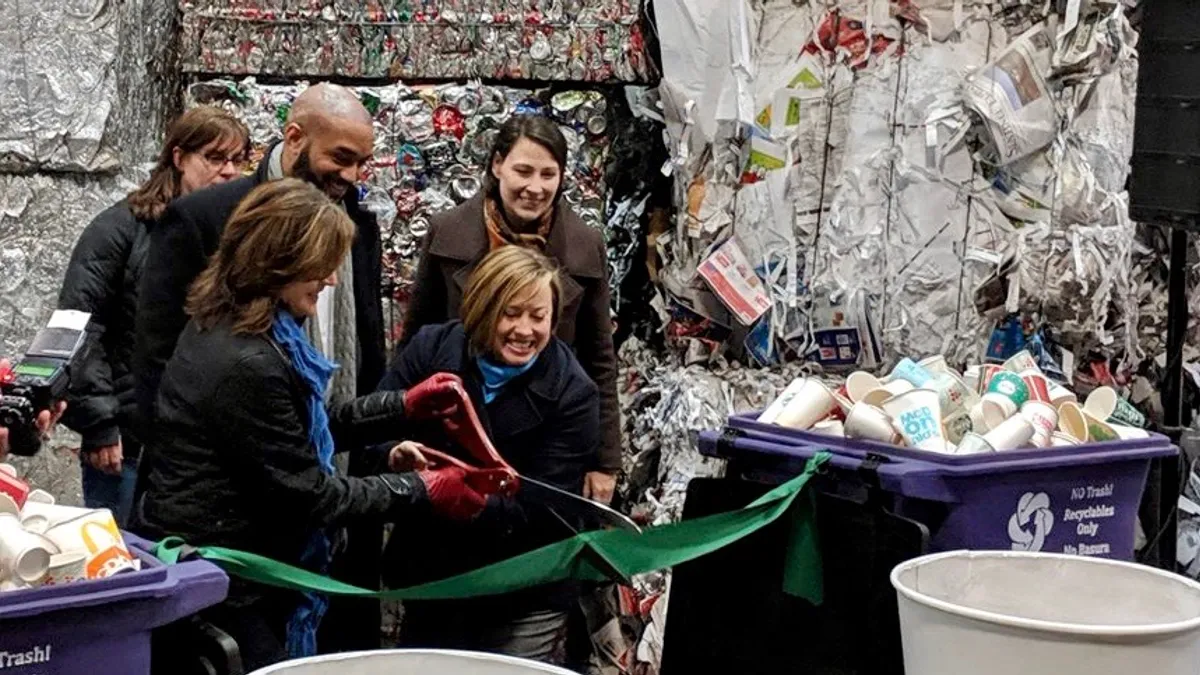Dive Brief:
- Denver residents participating in the city's recycling program can now add paper cups to their curbside carts. The Denver Post reports that this is the first addition to the city's recycling list since 2012. The change comes via a partnership between Denver Public Works, Alpine Waste & Recycling, the Foodservice Packaging Institute (FPI) and Sustana.
- FPI provided technical assistance and educational funding. “Our approach relies on strong end markets partnering with recycling processors and communities educating their residents to ensure these materials are recycled properly," said President Lynn Dyer in a statement.
- Alpine announced a new partnership with Wisconsin mill Sustana earlier this fall to process cups from a broad range of sources beyond curbside residential programs. Sustana has found its process can handle the polyethylene cup liner when cups are included in carton bales.
Dive Insight:
According to FPI, 16 North American mills can now accept poly-coated cups. This makes Denver FPI's fourth "community partner" — along with Louisville, Kentucky; Chattanooga, Tennessee and Washington, D.C — to add paper cups or other foodservice packaging within the past year. Initial reports indicate contamination rates have come down as a result due to new education around keeping recyclables clean and dry. San Francisco also added cups to its program independently in 2017.
With market pressures forcing some cities to cut back on their list of accepted materials, the addition may feel counterintuitive. At the same time the drive toward "zero waste" or high recycling targets, coupled with corporate activity to improve the environmental footprint of commonly used products, have been motivating factors.
“We make a lot of food service packaging, so are we very concerned about what happens to it end of life," said WestRock's Director of Public Policy Rhea Hale during the Municipal Waste Management Association's October conference. “If we don’t figure out a way to recycle our products, people will not use our products. So they will not exist."
According to Hale, WestRock and others have experimented unsuccessfully with this area in the past, so the progress is promising. Because cup fibers are longer than the average material in a mixed paper bale, they can actually create a higher yield and help a mill's process. Earlier this fall, WestRock was announced to be working with Starbucks, Sustana and Seda as part of another successful pilot program to recycle 25 million cups. WestRock has also announced it will accept mixed paper bales with foodservice packaging at eight recycled paper mills.
Through its Center for the Circular Economy, Closed Loop Partners launched its own "NextGen Cup Challenge" earlier this year, which has since received a combined $10 million in funding from Starbucks and McDonald's.
Coffee cups comprise less than 1% of Denver's residential recycling stream, but they play a symbolic role in daily consumption habits. As Denver Public Works noted at the end of its press release, "even though paper cups can now be recycled, reusable cups are still the best environmental choice." But with reusable cups remaining the exception rather than the norm, companies that profit from the production and sale of to-go items are starting to publicly recognize that they have a greater role to play.
Alpine — now owned by GFL Environmental — previously made headlines for installing a robotic sorting unit with artificial intelligence that can sort cartons from other recycling products. That project also received financial support from the packaging industry.















